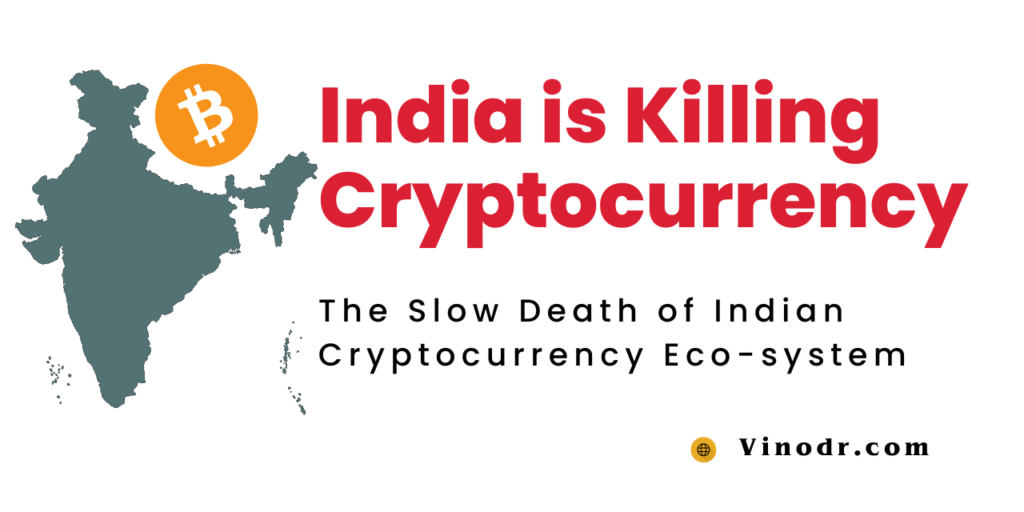India is Killing Cryptocurrency: The Slow Death of Indian Cryptocurrency Eco-system
Over the past decade, the cryptocurrency ecosystem has experienced tremendous growth and captured the world’s attention. Cryptocurrencies, led by Bitcoin, have revolutionized finance, challenged traditional banking systems, and attracted a dedicated community of enthusiasts. However, recent market trends and regulatory challenges have raised concerns about the future of this once-promising industry. Some skeptics argue that the cryptocurrency ecosystem is slowly fading away, but is this truly the case?
The Rise and Fall of Cryptocurrencies:
The meteoric rise of cryptocurrencies, particularly Bitcoin, sparked an unprecedented wave of innovation and investment. In a short span of time, numerous altcoins and blockchain projects emerged, each promising to solve real-world problems and disrupt various industries. The crypto market reached staggering valuations, attracting both individual investors and institutional players.
However, like any emerging technology, the cryptocurrency market experienced significant volatility and speculative excesses. The boom-and-bust cycles, coupled with the absence of proper regulations, exposed investors to substantial risks. The market corrections and periodic crashes have led some to believe that the end is near for cryptocurrencies.
Regulatory Challenges and Maturation:
One of the critical hurdles for cryptocurrencies to overcome is regulatory uncertainty. Governments worldwide have grappled with how to classify and regulate digital assets effectively. Some countries have embraced cryptocurrencies, recognizing their potential economic benefits, while others have taken a more cautious approach or imposed outright bans.
Despite the challenges, regulatory frameworks are gradually being established to provide more clarity and consumer protection. Governments and financial institutions have realized the importance of cryptocurrencies and are working to strike a balance between innovation and oversight. As regulations evolve, the market is likely to mature, providing a more stable foundation for cryptocurrencies to thrive.
The Indian cryptocurrency ecosystem has recently faced significant challenges, including declining trading volumes and a hardening stance from regulatory bodies. These factors have raised concerns about the evaporation of interest and the potential impact on the market. In particular, the imposition of taxes by the union government and the cautious approach taken by the RBI contributed to the diminishing demand for cryptocurrencies.
Declining Trading Volumes and Tax Implications:
One major indicator of the diminishing interest in cryptocurrencies has been the significant decline in trading volumes in Indian exchanges, with a staggering drop of over 90% in the past year. This decline can be attributed, in part, to the tax policies imposed by the union government. The introduction of taxes on cryptocurrency transactions has introduced additional costs and complexities for traders, leading to a reduction in trading activity.
The tax burden has affected both individual investors and institutional players, who have become more cautious due to the potential tax liabilities associated with cryptocurrency transactions. This has resulted in a dampening effect on the overall market sentiment and contributed to the decline in trading volumes.
Indian-based cryptocurrency exchanges are planning to enter into equity trading to stay afloat.
Hardening Stance of the Banking Regulator:
Another factor influencing the declining interest in cryptocurrencies is the hardening stance of the banking regulator, the Reserve Bank of India (RBI). The RBI has expressed concerns about the widespread adoption of private cryptocurrencies, viewing them as a risk to monetary stability. This stance has sent a clear message to the market that the regulatory environment for cryptocurrencies will likely become even more stringent in the future.
The cautionary approach taken by the RBI has raised uncertainties and deterred potential investors and market participants. The lack of clear guidelines and regulatory clarity has created a sense of apprehension within the cryptocurrency ecosystem, further reducing demand for cryptocurrencies.
G20 and India’s Drive for Crypto Regulation
India’s finance ministry has set forth an ambitious objective during its presidency at G20—to establish a consensus on cryptocurrency regulation among the world’s major economies. Given the borderless nature of cryptocurrencies, effective regulation necessitates collaboration and cooperation between nations.
In November of the previous year, Finance Minister Nirmala Sitharaman emphasized the importance of regulating the crypto space as a key priority for the G20. India now faces the challenge of convincing global stakeholders that regulating private cryptocurrencies, marginalizing their influence, and preventing their mainstream adoption is essential.
The country’s regulatory authority has articulated the need for a globally coordinated approach to assessing the risks posed to emerging markets and developing economies in comparison to advanced economies. These risks encompass macroeconomic challenges such as losing control over monetary policies and experiencing local currency volatility. Additionally, there are concerns regarding development challenges, including weaker capabilities to address anti-money laundering (AML) and combating the financing of terrorism (CFT) risks, as well as cross-border challenges related to oversight.
By highlighting these concerns, India aims to foster a broader understanding of the potential risks associated with private cryptocurrencies. The objective is to garner support for regulatory measures that ensure the stability and security of economies, particularly in emerging markets and developing economies.
India’s push for cryptocurrency regulation during its G20 presidency reflects the recognition that addressing the complexities and risks associated with cryptocurrencies requires a collaborative effort among major economies. By emphasizing the need for a globally coordinated approach, India seeks to encourage consensus on the regulation of private cryptocurrencies, marginalize their impact, and prevent their widespread adoption. As discussions continue, it remains to be seen whether India can successfully convey the importance of regulating cryptocurrencies to the international community and rally support for measures that safeguard economies from potential vulnerabilities.
The Future:
While it is true that the cryptocurrency ecosystem is facing significant challenges in India and over the World, it would be premature to declare its demise. The industry has evolved considerably since its inception, overcoming obstacles and adapting to changing market conditions. Regulatory developments, technological advancements, and a more discerning investor base are all indicators of a maturing ecosystem.
Cryptocurrencies have the potential to reshape finance, drive innovation (Metaverse), and empower individuals worldwide. As the industry navigates through its current challenges, it is important to remain open to the possibility of a renewed and thriving ecosystem. The cryptocurrency revolution may be undergoing a necessary transformation, setting the stage for a more sustainable and inclusive future.



